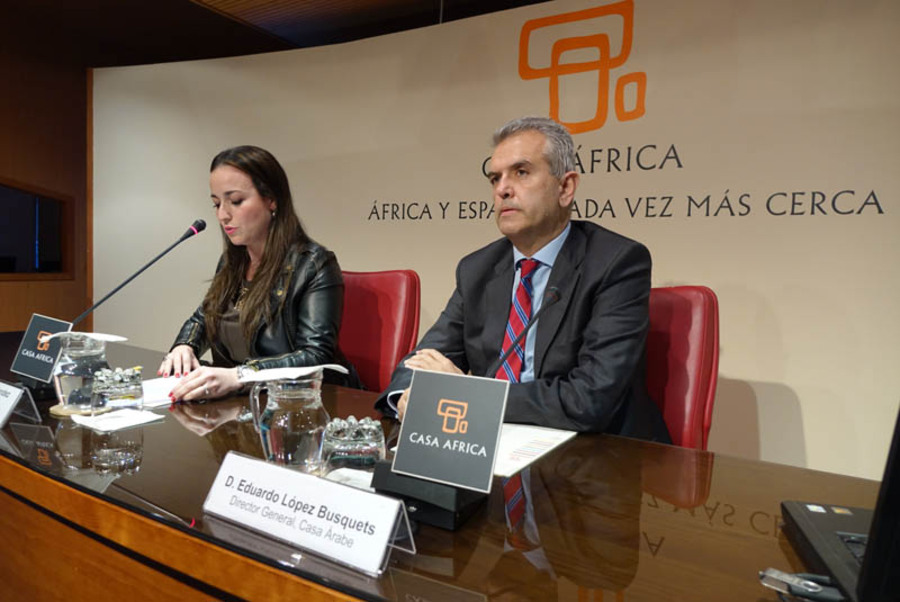Conferences and debates
Index / Activities / Conferences and debates / Arab springs, Jihadism and democracy
Arab springs, Jihadism and democracy
March 24, 20157.00 pm
LAS PALMAS DE GRAN CANARIA
Nelson Mandela Auditorium at Casa África (c/ Alfonso XIII, 5).
7.00 pm
Free entrance until the event’s capacity is reached.
Given by Eduardo López Busquets, General Director of Casa Árabe.
López Busquets is giving this talk at the headquarters of Casa África, where he will be introduced by Arianne Hernández, that institution’s General Secretary.
Since the popular uprising that caught fire in Tunisia in December of 2010, the Arab world has never been the same again. The initial revolts were welcomed with contagious enthusiasm, and as the dictators fell, the voices of the people, silenced for decades, took over the public sphere. The term “Arab Spring” was coined and embraced by both the media and observers, as well as its participants. The romantic reminiscence of 1968 Prague seemed to fill the air, though also its dramatic outcome.
Four years later, the scene is completely different and the Arab Spring’s spirit of renewal seems to have been overshadowed by a long and uncertain winter, to which Jihadism has contributed to a large degree. Certain countries, like Syria, Libya and Yemen, have become caught up in disastrous civil wars. In Egypt, the transition towards a democratic government has been interrupted by deep political divisions, military intervention, an economic in crisis and dysfunctional state institutions. Although Tunisia seems to have escaped the reigning polarization and is on a path towards a better future, its socio-economic situation is still fragile.
Despite the widespread feeling of despair, diverse role-players and groups continue working from different realms within these countries to achieve a significant change in the living conditions and chance for opportunities so as to attain the initial revolutionary goals of “bread, freedom and social justice.” Within this context, “social entrepreneurship” is a process which must overcome many different obstacles. It is a story which must be told. The wave of popular movements gave rise to citizen-based initiatives and even new companies that have breathed air into the region’s revolutions, and though unknown by most, they continue to be a phenomenon which will have important effects in terms of these societies’ development.
For instance, activists, businesspeople, artists, musicians and filmmakers have contributed to rebuilding the political, economic, social and cultural fabric, thereby reflecting a growing interest in cooperating with others on topics in the common interest. The development of plural systems in which all political forces participate without one monopolizing power is a difficult task in countries with a severe lack of democratic experience. They must start somewhere, though. The exercise in creating a new culture of debate and consensus can be achieved through expression and taking on risks and rejecting traditional social hierarchies and the government’s hegemony, thereby unleashing hidden potential by breaking the bonds of fear.
Since the popular uprising that caught fire in Tunisia in December of 2010, the Arab world has never been the same again. The initial revolts were welcomed with contagious enthusiasm, and as the dictators fell, the voices of the people, silenced for decades, took over the public sphere. The term “Arab Spring” was coined and embraced by both the media and observers, as well as its participants. The romantic reminiscence of 1968 Prague seemed to fill the air, though also its dramatic outcome.
Four years later, the scene is completely different and the Arab Spring’s spirit of renewal seems to have been overshadowed by a long and uncertain winter, to which Jihadism has contributed to a large degree. Certain countries, like Syria, Libya and Yemen, have become caught up in disastrous civil wars. In Egypt, the transition towards a democratic government has been interrupted by deep political divisions, military intervention, an economic in crisis and dysfunctional state institutions. Although Tunisia seems to have escaped the reigning polarization and is on a path towards a better future, its socio-economic situation is still fragile.
Despite the widespread feeling of despair, diverse role-players and groups continue working from different realms within these countries to achieve a significant change in the living conditions and chance for opportunities so as to attain the initial revolutionary goals of “bread, freedom and social justice.” Within this context, “social entrepreneurship” is a process which must overcome many different obstacles. It is a story which must be told. The wave of popular movements gave rise to citizen-based initiatives and even new companies that have breathed air into the region’s revolutions, and though unknown by most, they continue to be a phenomenon which will have important effects in terms of these societies’ development.
For instance, activists, businesspeople, artists, musicians and filmmakers have contributed to rebuilding the political, economic, social and cultural fabric, thereby reflecting a growing interest in cooperating with others on topics in the common interest. The development of plural systems in which all political forces participate without one monopolizing power is a difficult task in countries with a severe lack of democratic experience. They must start somewhere, though. The exercise in creating a new culture of debate and consensus can be achieved through expression and taking on risks and rejecting traditional social hierarchies and the government’s hegemony, thereby unleashing hidden potential by breaking the bonds of fear.

